
Dorset is a ceremonial county in South West England. It is bordered by Somerset to the north-west, Wiltshire to the north and the north-east, Hampshire to the east, the Isle of Wight across the Solent to the south-east, the English Channel to the south, and Devon to the west. The largest settlement is Bournemouth, and the county town is Dorchester.

Bournemouth is a coastal resort town in the Bournemouth, Christchurch and Poole unitary authority area, in the ceremonial county of Dorset, England. The 2021 census built-up area had a population of 196,455, making it the largest town in Dorset.
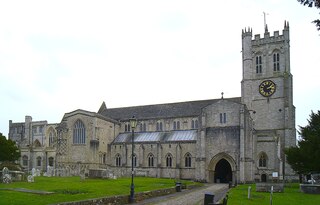
Christchurch is a town and civil parish on the south coast of Dorset, England. The parish had a population of 31,372 in 2021. It adjoins Bournemouth to the west, with the New Forest to the east. Part of the historic county of Hampshire, Christchurch was a borough within the administrative county of Dorset from 1974 until 2019, when it became part of the new Bournemouth, Christchurch and Poole unitary authority.

Hampshire County Council (HCC) is the upper-tier local authority for the non-metropolitan county of Hampshire in England. The council was created in 1889. The county council provides county-level services to eleven of the thirteen districts geographically located within the ceremonial county of Hampshire. The county council acts as the upper tier of local government to approximately 1.4 million people. It is one of 21 county councils in England.
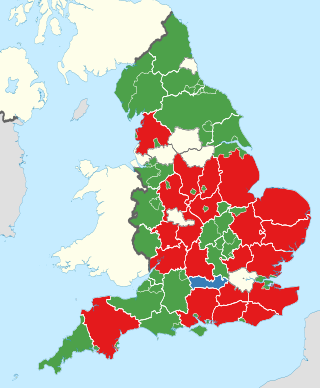
A non-metropolitan county, or colloquially, shire county, is a subdivision of England used for local government.

Non-metropolitan districts, or colloquially "shire districts", are a type of local government district in England. As created, they are sub-divisions of non-metropolitan counties in a two-tier arrangement. Non-metropolitan districts with borough status are known as boroughs, able to appoint a mayor and refer to itself as a borough council. Some shire counties, for example Cornwall, now have no sub-divisions so are a single non-metropolitan district.
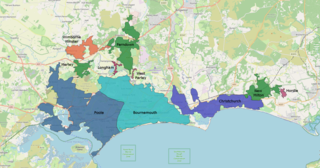
The South East Dorset conurbation is a multi-centred conurbation on the south coast of Dorset in England.
Bournemouth Borough Council was the local authority for Bournemouth in Dorset, England between 1974 and 2019. Prior to 1974 Bournemouth had been a county borough within Hampshire. Under the Local Government Act 1972 Bournemouth became a non-metropolitan district within Dorset on 1 April 1974, with the same boundaries as the former county borough. On 1 April 1997 it became a unitary authority, taking over the functions previously provided for the area by Dorset County Council. In 2019 the council was abolished, merging with Christchurch and Poole to form Bournemouth, Christchurch and Poole.

The unitary authorities of England are a type of local authority responsible for all local government services in an area. They combine the functions of a non-metropolitan county council and a non-metropolitan district council, which elsewhere in England provide two tiers of local government.

Dorset Fire and Rescue Service is the former statutory Fire and Rescue Service for the area of Dorset, South West England. The Service Headquarters were located in Colliton Park, Dorchester, but as of October 2008 moved to a new purpose built location in Poundbury.

Bournemouth Borough Council was the local authority of Bournemouth in Dorset, England and ceased to exist on 1 April 2019. It was a unitary authority, although between 1974 and 1997 it was an administrative district council with Dorset. Previously most of the borough was part of Hampshire.
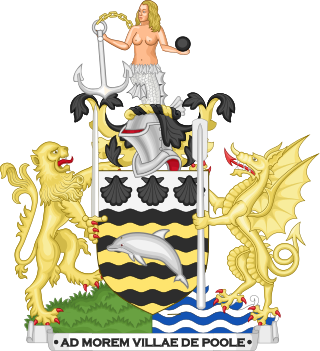
Poole Borough Council was the unitary authority responsible for local government in the Borough of Poole, Dorset, England. It was created on 1 April 1997 following a review by the Local Government Commission for England (1992), becoming administratively independent from Dorset County Council, and ceased to exist on 1 April 2019. Its council comprised 16 wards and 42 councillors and was controlled by a Conservative administration before it was merged into Bournemouth, Christchurch and Poole Council.

Bournemouth, Christchurch and Poole (BCP) is a unitary authority area in the ceremonial county of Dorset, England. The district was created on 1 April 2019 by the merger of the areas that were previously administered by the unitary authorities of Bournemouth and Poole, and the non-metropolitan district of Christchurch. The authority covers much of the area of the South Dorset conurbation.
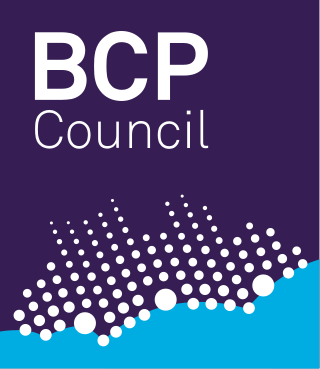
Bournemouth, Christchurch and Poole Council, which styles itself BCP Council, is the local authority for Bournemouth, Christchurch and Poole, a local government district in the ceremonial county of Dorset, England. The council is a unitary authority, being a district council which also performs the functions of a county council. It is independent from Dorset Council, the unitary authority which administers the rest of the county. The district was created on 1 April 2019 by the merger of the areas that were previously administered by the unitary authorities of Bournemouth and Poole, and the non-metropolitan district of Christchurch.
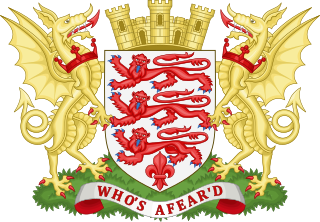
Dorset Council is the local authority for the non-metropolitan county of Dorset in England. It is a unitary authority, being a district council which also performs the functions of a county council. The non-metropolitan county is smaller than the ceremonial county of Dorset, which also includes Bournemouth, Christchurch and Poole. The council was created in 2019 when local government across Dorset was reorganised.

Structural changes to local government in England took place between 2019 and 2023. Some of these changes continue the trend of new unitary authorities being created from other types of local government districts, which was a policy of Communities Secretary Robert Jenrick from 2019.

Dorset is a unitary authority area, existing since 1 April 2019, in the ceremonial county of Dorset, England. It covers all of the ceremonial county except for Bournemouth, Christchurch and Poole. The council of the district is Dorset Council, which is in effect Dorset County Council re-constituted so as to be vested with the powers and duties of five district councils which were abolished, and shedding its partial responsibility for and powers in Christchurch.

The County Hall is a municipal facility at Colliton Park in Dorchester, Dorset, England.

The Alliance for Local Living (ALL) was a minor localist party and political group based in Dorset, with separate branches in the two authorities, ALL for Bournemouth, Christchurch and Poole and ALL for Dorset. The BCP office was based in Poole, whilst the Dorset office was based in Weymouth. The party was deregistered in November 2023, at which point it had four councillors on Dorset Council, who continued to sit together as an informal grouping. The group became Independents for Dorset in 2024.

Bournemouth Town Hall, also known as the Civic Centre and formerly the Mont Dore Hotel, is a municipal facility in Bourne Avenue, Bournemouth, England. The town hall, which is the meeting place of Bournemouth, Christchurch and Poole Council, is a Grade II listed building. The town hall stands opposite Bournemouth Gardens and the Bournemouth War Memorial and is adjacent to St. Andrew's Church, Richmond Hill.






















